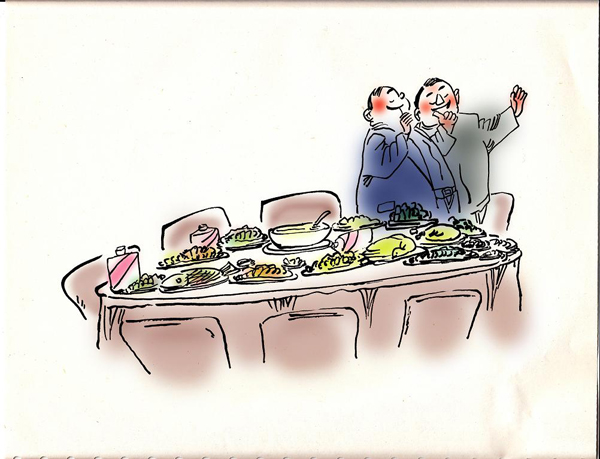Can Chinese save face and save money?
Updated: 2013-01-23 18:27
(Xinhua)
|
|||||||||||
BEIJING - China's latest call for greater frugality among officials and citizens may be impeded by the nation's entrenched culture of "face".
Face is a big thing for Chinese, both traditionally and fundamentally. The concept, loosely defined as a notion of one's reputation rooted in pride and self-esteem, can be best observed at China's banquets, where the idea that "excessive dishes mean great hospitality" remains a guiding principle.
 |
| [Cartoon by Li Jianjun /cartoon.chinadaily.com.cn] |
Uneaten food allows hosts to "gain face," as they would otherwise be considered stingy or lacking in finances if diners ate everything on the table.
Chinese revelers, many of whom are officials, throw extravagant feasts in restaurants to flaunt their wealth or show hospitality to their guests.
Although an average person might throw a banquet and pay for everything himself, he would hesitate before packing up the leftovers, as this could cause him to lose face in front of his guests.
Meanwhile, the face culture is so engrained in Chinese society that many would be embarrassed to host a feast on the cheap.
So, when Xi Jinping, top leader of Communist Party of China, on Tuesday told the 82 million CPC members to honor frugality and curb the rampant waste created by banquets, face-loving officials and consumers surely let out some groans and grumbles.
Xi's call came amid China's full-fledged frugality campaign, which has come down hard on China's officials accustomed to extravagances.
They bade farewell to red carpet greetings, fresh floral arrangements in conference halls and welcome banners and balloons -- things that used to give them face -- in December, when the CPC told them to abstain from ostentatious ceremonies.
| ||||
However, it seems out of place in today's China, where it is no longer difficult for most Chinese households to provide ample food for their guests. Whether guests have been entertained rarely hinges on the amount of food left on plates.
More Chinese have gone from eating just to fill up their bellies to appreciating food, and they are also giving special attention to the healthiness and refinement of their diets.
China's frugality drive is unlikely to gain traction as long as the face culture prevails, which will continue to generate a great deal of waste.
According to China Central Television (CCTV), an estimated 200 billion yuan ($32 billion) worth of food -- enough to feed about 200 million people for one year -- goes to waste in China each year.
This figure is astonishingly high in a country where 128 million people live on less than $1 a day, and those worried about face should turn their concerns to those with empty stomaches.
Related Stories
Xi Jinping vows 'power within cage of regulations' 2013-01-22 20:16
Xi Jinping vows unswerving fight against corruption 2013-01-22 15:53
Xi delivers speech on disciplinary watchdog meeting 2013-01-22 13:32
Today's Top News
Police continue manhunt for 2nd bombing suspect
H7N9 flu transmission studied
8% growth predicted for Q2
Nuke reactor gets foreign contract
First couple on Time's list of most influential
'Green' awareness levels drop in Beijing
Palace Museum spruces up
Trading channels 'need to broaden'
Hot Topics
Lunar probe , China growth forecasts, Emission rules get tougher, China seen through 'colored lens', International board,
Editor's Picks

|

|

|

|

|

|





